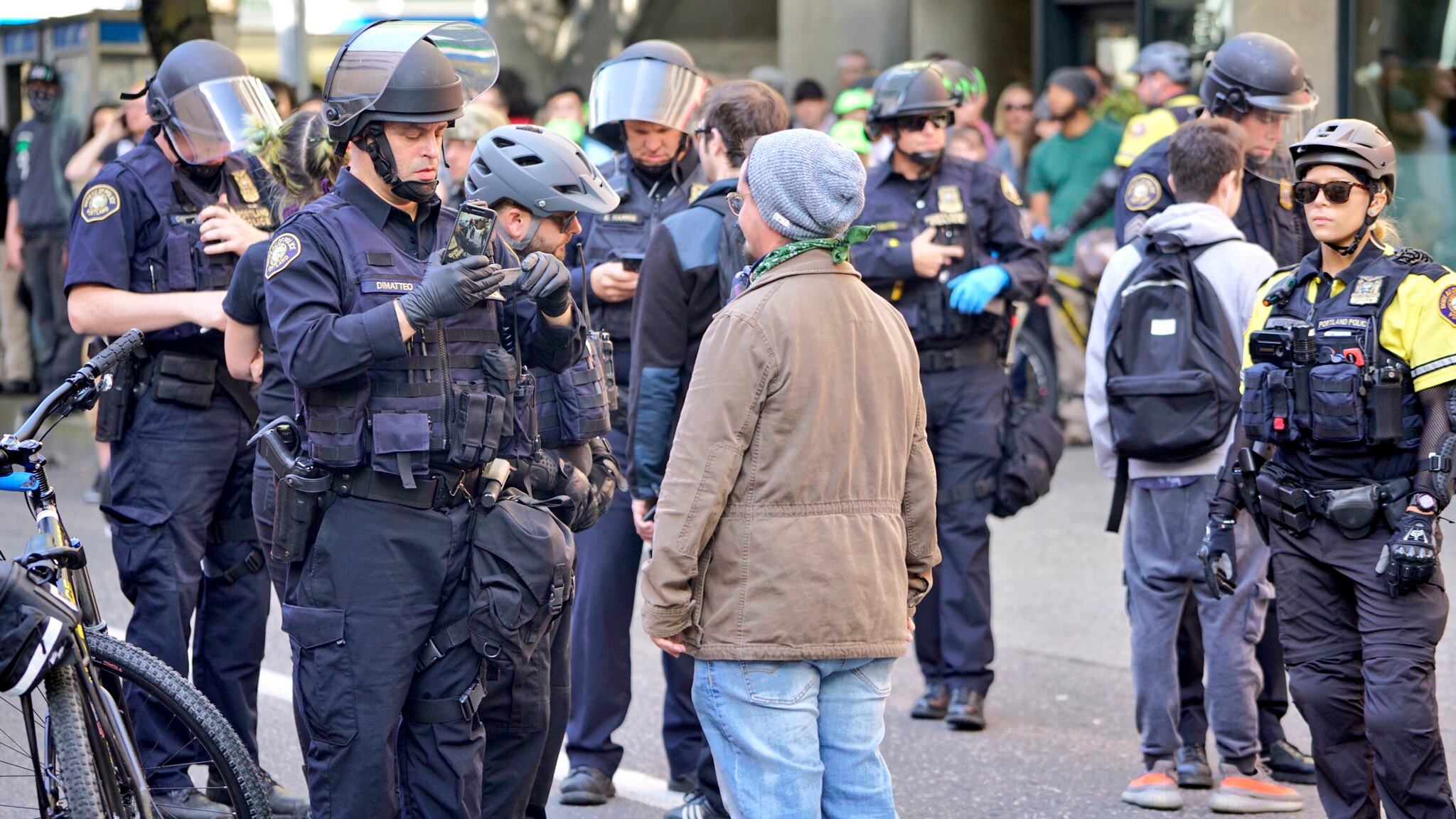One of the most fraught days in a year of downtown street protests is about to result in a lawsuit against the Portland Police Bureau.
The American Civil Liberties Union of Oregon will take the unusual step Nov. 15 of suing the bureau in U.S. District Court for police tactics that detained protesters and journalists at street events June 4, days after the racially motivated double slaying on a MAX train in Northeast Portland.
The civil rights group alleges that the city, and police in particular, violated the U.S. Constitution by detaining hundreds of protesters in downtown streets, holding them for more than an hour, photographing them and recording their personal information.
The lawsuit names five plaintiffs and a class of 200 to 250 other, unnamed plaintiffs.
Here's who is suing the city, and why.
Who Was There

Patrick Garrison, 23
Lives in the Portsmouth neighborhood
Why he went: Garrison attended the protest as a legal observer for the ACLU.
Why he's suing: "My main concern is the Portland Police Bureau's inability or unwillingness to de-escalate situations at protests. I have been to a lot of protests as a volunteer legal observer with the ACLU and have seen how the police response to protesters gets out of control and make protests confusing, chaotic and downright dangerous."

Jennifer Nickolaus, 38
Lives in the Foster-Powell neighborhood
Why she went: Nickolaus attended the protest to honor the victims of the MAX train murders, and to show support for the two teenage girls who were the target of racially motivated harassment on the train.
Why she's suing: "The Portland police have repeatedly escorted and protected the alt-right groups while, at the same time, violently quashing the protesters on the left, and infringing on or outright denying us the right to peacefully assemble."

Chris Whaley, 41
Lives in the Foster-Powell neighborhood
Why he went: Whaley attended the protest with his wife, Jennifer Nickolaus, to reject the fascism and racism that he says has been growing in the wake of the 2016 election.
Why he's suing: "It is clear that Portland is ill-equipped to deal with dissenting voices in a fair way. When protests are regularly met by militarized police with stun grenades, pepper spray and rubber bullets, it is a serious threat to our rights under the First Amendment to gather in solidarity or protest and to share ideas."

Jade Sturms, 27
Lives in the Montavilla neighborhood
Why she went: Sturms showed up June 4 to oppose what she viewed as hateful far-right demonstrations in Portland.
Why she's suing: "I want to use my experience to hold our police and our city accountable. Their use of indiscriminate violence and suppression towards thousands of peaceful protesters like myself is illegal, unjust and horrifying to witness firsthand."
The fifth named plaintiff, Josef Haber, was out of the country and unavailable at press time.

What Happened
On June 4, far-right activist group Patriot Prayer held a so-called "Freedom Rally," defying pleas by Mayor Ted Wheeler to allow a raw city to grieve the May 26 killings of Taliesin Myrddin Namkai-Meche and Ricky Best on a MAX train.
Thousands of counterprotesters flooded downtown Portland to condemn the rally, vastly outnumbering the right-wing extremists.
Police officers formed a cordon between the warring sides of the protest. Demonstrators shouted insults and taunts across the police line. Some protesters threw items at the officers, including tampons that had been dyed red.
A few blocks north, in the streets outside Pioneer Place, police surrounded a group of at least 345 people and detained them en masse, a technique called "kettling." The police forced each person caught in the kettle to submit to a photograph and show personal identification, which officers recorded before releasing the protesters one by one.
Portland police arrested 14 people at the protest. In the days that followed, the bureau said it would destroy the records of each protester's identifying information after the investigations related to the demonstration were complete.

Why the ACLU Is Suing
The ACLU says Portland police acted unconstitutionally by detaining protesters without cause, violating their right to be "free from unreasonable seizure and assault under the Fourth and Fourteenth Amendments of the United States Constitution." The lawsuit also alleges a violation of the state constitution's protection against unreasonable seizure.
Portland police spokesman Sgt. Christopher Burley says the bureau does not comment on pending litigation.

